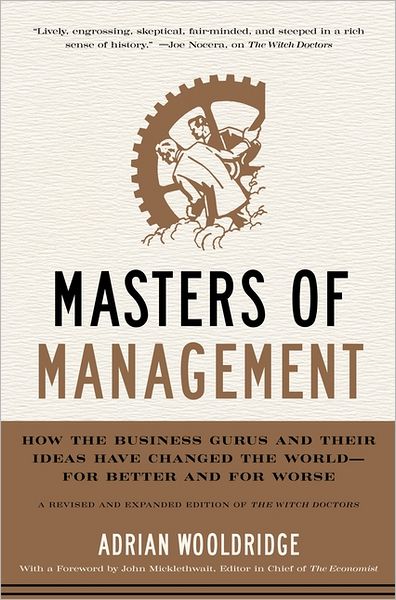Adrian Wooldridge’s Masters of Management is subtitled: How the Business Gurus and Their Ideas Have Changed the World–For Better and For Worse. Wooldridge delivers a breezy survey of the works of Peter Drucker (The Effective Executive), Tom Peters (In Search of Excellence), Tom Friedman (The World is Flat), Malcolm Gladwell (The Tipping Point), Stephen Covey (The Seven Habits of Highly Effective People), Jim Collins (Built to Last), and over a dozen other management experts. If you have any interest in the latest management fads and trends, Wooldridge summerizes those, too. Anyone looking for a up-to-date overview of management will find it in Masters of Management. GRADE: B+
THE CHECKLIST MANIFESTO: HOW TO GET THINGS DONE RIGHT By Atul Gawande


Atul Gawande is a surgeon who is tormented by sloppy systems. Gawande cites dozens of examples where a simple checklist can improve the operations of any organization. Given his medical background, Gawande provides plenty of stories where checklists saved lives and money in hospitals. But Gawande also has dipped into other areas where checklists are considered essential: for pilots flying Boeing’s planes and for investors considering buying stocks. The human memory is fallible. Sometimes we think we did something when we didn’t. Checklists catch those errors and correct them. Our lives are becoming more complicated. Checklists are a handy device to help us keep control. GRADE: B+
BARRY LYNDON [Blu-ray]

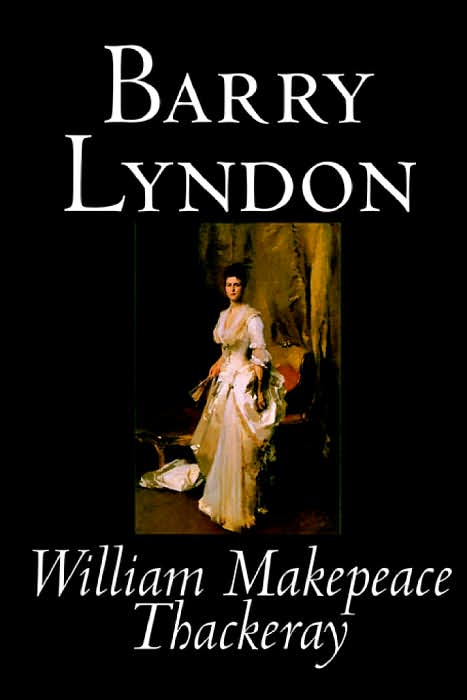
Roger Ebert, in his 1976 review of Barry Lyndon, wrote “this must be one of the most beautiful films ever made.” That’s why the Blu-ray of Barry Lyndon is the best version to watch. Ireland and Europe never looked so good. But there are significant differences between Stanley Kubrick’s film and William Makepeace Thackeray’s classic novel. Thackeray’s Barry Lyndon narrates his own story. Critics of the time called Barry Lyndon the first novel without a hero. Barry Lyndon is a scoundrel and a con-man who manages to marry a very wealthy widow. But the Fates are against him. In Kubrick’s 3-hour film, an omnipresent narrator’s voice-over sets the scenes. Ryan O’Neal is a strange casting choice. The trials and tribulations of Barry Lyndon in the film version are distanced by Kublick’s aloof, almost documentary style in this film. Although many critics, including Ebert, consider Barry Lyndon one of Kubrick’s best films, I found it a bit tedious. Barry Lyndon isn’t a great movie, but it sure looks great! GRADE: B
MARTIN LUTHER KING DAY

THE MUPPETS

The Muppets is another movie marketed to kids, but it is really for nostalgic adults. And evil tycoon (Chris Cooper) is about to destroy The Muppet Studios (to drill for oil) and the only way this disaster can be averted is to “put on a show.” Part of the movie shows how Kermit along with new character, Walter, Jason Segel (from “How I Met Your Mother”), and Amy Adams reunites The Muppets to save their past. Cameos by a dozen other “stars” including Jack Black, Emily Blunt, and Alan Arkin pop up throughout the film. However, most kids will find this movie a drag. Adult fans of The Muppets will rejoice. GRADE: B
“Tim Tebow’s Fire” by John Parr (St. Elmo’s Fire remake) – Original Video
FORGOTTEN BOOKS #151: SWORDSMAN OF MARS & OUTLAWS OF MARS By Otis Adelbert Kline
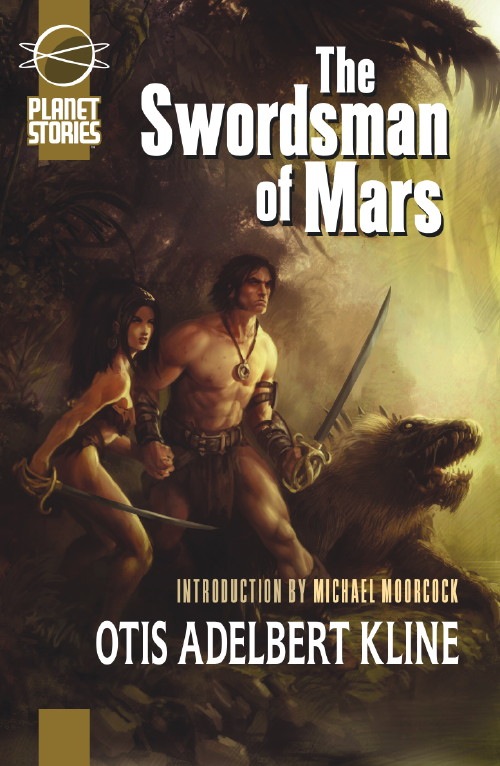

Otis Adelbert Kline cloned Edgar Rice Burroughs’ Mars novels and produced Swordsman of Mars and Outlaws of Mars. Two Earthmen are sent to Mars through a telepathic mind swap. In Swordsman of Mars our hero is Harry Thorne, a young man from a wealthy family who has been falsely compromised. Thorne agrees to the incredible experiment and finds himself thrust into a dangerous political battle with the second, evil, Earthman. In Outlaws of Mars an American soldier, Jerry Morgan, agrees to be transported to the Red Planet. Morgan arrives on Mars and is instantly embroiled in a civil war. Both books are based on Burroughs’ John Carter novels. Readers who love the action in Burroughs’ Mars novels will find plenty to like in these two imitations.
HUGO in 3D
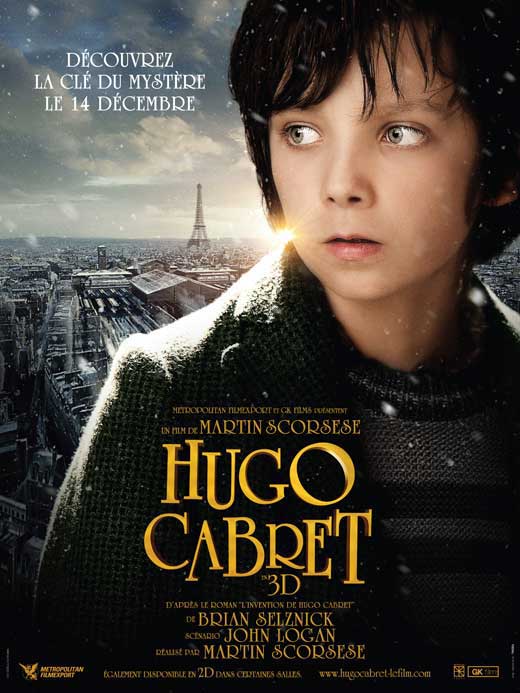 Martin Scorsese’s Hugo follows fairly closely the book it’s based on: the Caldecott Award winning The Invention of Hugo Cabret by Brian Selznick. The disappointing box office numbers for this movie are due to its subject matter (memory and loss) and its length (128 minutes, but it seems longer). This is not a kid movie to take some squirmy pre-teens to see. Adults will appreciate its message and the homage Scorsese makes to early French films. GRADE: B+
Martin Scorsese’s Hugo follows fairly closely the book it’s based on: the Caldecott Award winning The Invention of Hugo Cabret by Brian Selznick. The disappointing box office numbers for this movie are due to its subject matter (memory and loss) and its length (128 minutes, but it seems longer). This is not a kid movie to take some squirmy pre-teens to see. Adults will appreciate its message and the homage Scorsese makes to early French films. GRADE: B+
NOTHING TO LOSE, EVERYTHING TO GAIN: HOW I WENT FROM GANG MEMBER TO MULTIMILLIONAIRE ENTREPRENEUR By Ryan Blair
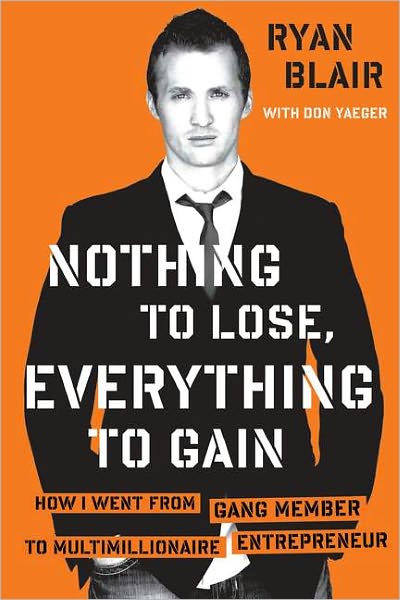
ALFRED HITCHCOCK PRESENTS: SEASON FIVE

Some critics think that Season Five of Alfred Hitchcock Presents was the best season of them all. Hitchcock directed the first two episodes, “Arthur” and “The Crystal Trench.” I enjoyed all 38 episodes especially “The Specialty of the House” and Steve McQueen in “Man From the South.” I own all five seasons on DVD, but if you only want to buy one season, Season Five is the one you want! GRADE: A+
EPISODE LISTING
Episode 1: “Arthur”
Episode 2: “The Crystal Trench”
Episode 3: “Appointment at Eleven”
Episode 4: “Coyote Moon”
Episode 5: “No Pain”
Episode 6: “Anniversary Gift”
Episode 7: “Dry Run”
Episode 8: “The Blessington Method”
Episode 9: “Dead Weight”
Episode 10: “Special Delivery”
Episode 11: “Road Hog”
Episode 12: “Specialty of the House”
Episode 13: “An Occurrence at Owl Creek Bridge”
Episode 14: “Graduating Class”
Episode 15: “Man From the South”
Episode 16: “The Ikon of Elijah”
Episode 17: “The Cure”
Episode 18: “Backward, Turn Backward”
Episode 19: “Not the Running Type”
Episode 20: “The Day of the Bullet”
Episode 21: “Hitch Hike”
Episode 22: “Across the Threshold”
Episode 23: “Craig’s Will”
Episode 24: “Madame Mystery”
Episode 25: “The Little Man Who Was There”
Episode 26: “Mother, May I Go Out to Swim?”
Episode 27: “The Cuckoo Clock”
Episode 28: “Forty Detectives Later”
Episode 29: “The Hero”
Episode 30: “Insomnia”
Episode 31: “I Can Take Care of Myself”
Episode 32: “One Grave Too Many”
Episode 33: “Party Line”
Episode 34: “Cell 227”
Episode 35: “The Schartz-Metterklume Method”
Episode 36: “Letter of Credit”
Episode 37: “Escape to Sonoita”
Episode 38: “Hooked”
